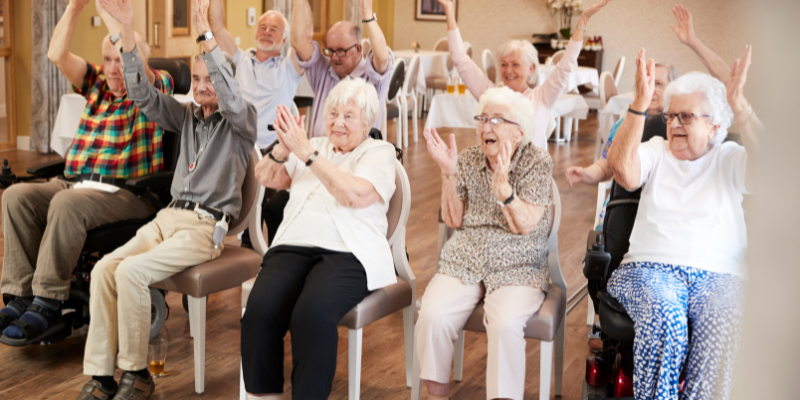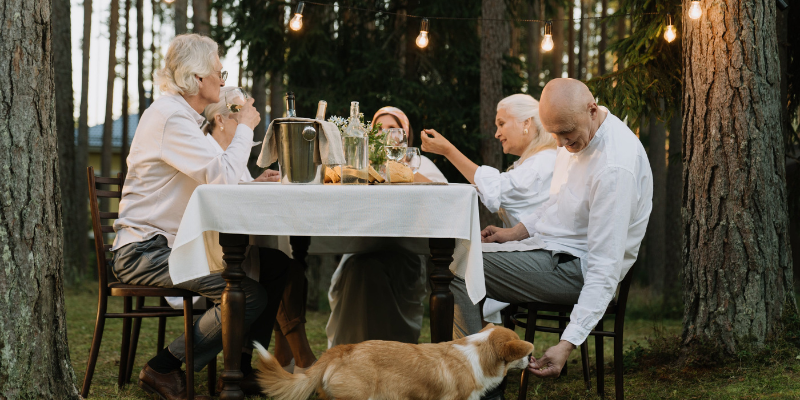As our population ages, it’s becoming more important then ever for Canadians to better understand social health, it’s impact on overall well-being, and how we can combat social isolation together.
Why is social health important for seniors?
Loneliness and social isolation pose serious risks to seniors across Manitoba ( and of course, the rest of the world as well). Studies have found that social isolation can have health risks comparable to smoking or obesity. Maintaining strong social connections isn't merely about companionship; it's a cornerstone of overall well-being. Social wellness contributes significantly to overall happiness, improved mental health, and quality of life. Research also shows that robust social networks can lead to longer, healthier lives, and better stress management, especially for seniors.
The Health Risks Associated with Social Isolation
Apart from the higher rates of serious cases of depression and anxiety, social isolation can have a direct impact on your physical health:
Increased risk of dementia
Increases your risk of developing dementia by roughly 50%.
Increased risk of stroke
Poor social relationships is associated with a 29% increased risk of heart disease and a 32% increased risk of stroke.
Increased risk of hospitalization and mortality
Heart failure patients who experience loneliness were associated with a 68% increased risk of hospitalization, 57% increased risk of emergency department visits, and a nearly 4 times increased risk of death.Why do seniors feel lonely as they get older?
As we age, various factors contribute to the increased risk of experiencing loneliness. The shifting dynamics in your life, such as declining mobility, the loss of significant loved ones, and a reduced social network due to geographical distance or life changes, often intensify feelings of isolation. In a region like Manitoba, where weather and geographic isolation can pose additional challenges, seniors may find it harder to maintain social connections. The combination of these circumstances, coupled with changes in familial structures, can lead seniors to experience a sense of disconnection and isolation, contributing significantly to feelings of loneliness.
How do we measure social health?
Sometimes it can be very easy to spot when a loved one’s mental well-being is declining or when they are starting to feel the effects of loneliness. Maybe their mood worsens or they reach out to tell you how they are feeling. Other times, it can be extremely difficult to spot, both from the perspective of a loved one or caregiver, and in one’s own self.
Questions to ask to measure social isolation
There are multiple tests like the Duke Social Support Index that can be conducted to help gauge ones needs for social support. However, these tests can be lengthy, tiring, and ultimately should be administered by a professional. Still there are several key indicators that can help evaluate someone’s social connectedness and give valuable insight into how they are feeling.
-
What is the number of times in the past week or month spent with someone not living with the individual?
-
What is the number of times in the past week they talked with friends/relatives in person or on the telephone?
-
Do they have someone they feel they can talk to about issues or concerns?
-
Do they express feelings of loneliness or isolation?
-
How often do they participate in community activities?
-
Do they find themselves feeling left out of social gatherings/ “People are around me, but not with me.”
-
Do they have activities that bring joy or a feeling of usefulness?
When asking these questions, What are we looking for? Key indicators that can help evaluate aspects of well-being like:
Social Support Networks
Engagement in Social Activities
Feelings of Loneliness
How can seniors improve their social health?

Community Engagement
Try to participate in local community groups and neighborhood associations. They help to cultivate meaningful connections. By engaging in localized groups centered around shared interests, seniors can build supportive relationships within the community, fostering a profound sense of belonging and camaraderie.
Senior Centres are also an excellent way of finding programs across Manitoba (that are often free). To find a location near you, check out the Manitoba Association of Senior Communities website.
Volunteering Opportunities
Research has shown that volunteering in your older years can have multiple positive impacts on your health. Volunteering gives you a reason to get out of the house and get more exercise but also provides stronger social connections while contributing to causes you care about, giving a better sense of ones usefulness and perceived purpose. Volunteering also positively impacts the community you belong to and Manitoba has many great volunteering opportunities. Here at Victoria Lifeline, we know first hand the importance of volunteering. We are proud to work with our local heroes everyday that help us keep vulnerable members of our community safe everyday!
Social Meals!
Food has connected humans throughout our history! Organizing or participating in social meals and communal dining events provides a wonderful avenue for seniors in Manitoba to connect. Sharing meals not only nourishes the body but also nourishes social bonds, fostering a sense of togetherness and community among older adults.

Embracing Video Chatting
Technology can help foster connectivity for seniors facing geographical or mobility challenges. Encouraging the use of digital platforms for video calls, social media engagement, and participation in online local communities can help keep seniors connected with family and friends.
Prioritizing Social Health for Manitoba's Seniors
Ensuring the social wellness of older Manitobans is an ongoing commitment. By recognizing the importance of social connections and actively supporting initiatives to combat loneliness and isolation, we can significantly enhance the well-being of our seniors.
This article is meant to be informational in nature and should not replace the advice of a trained healthcare professional. What works for some individuals, might be harmful to others. Consult a professional before making any significant changes.
